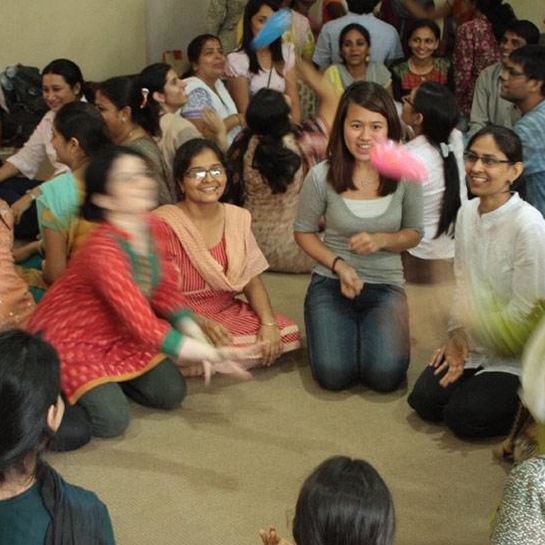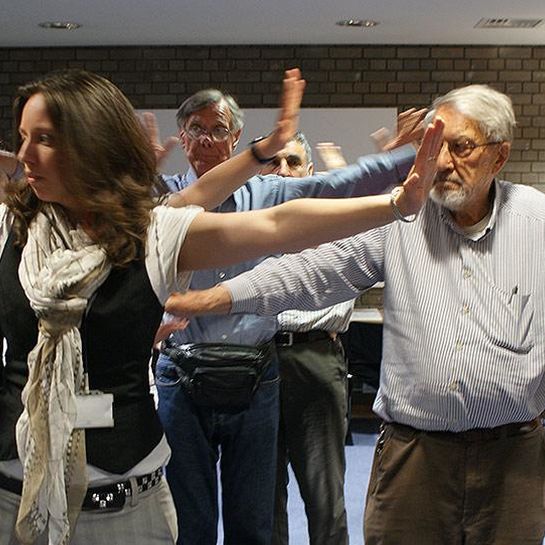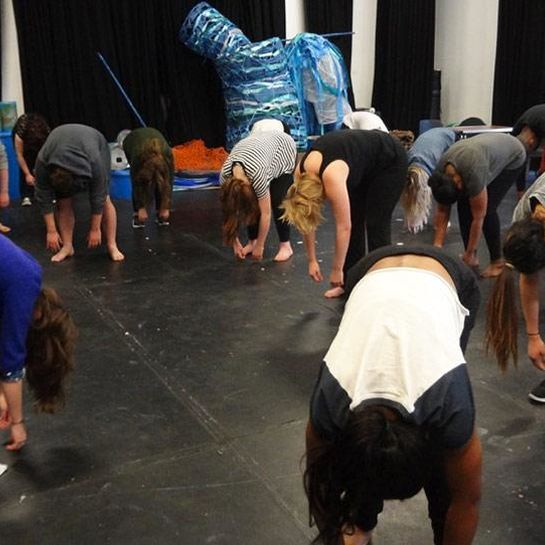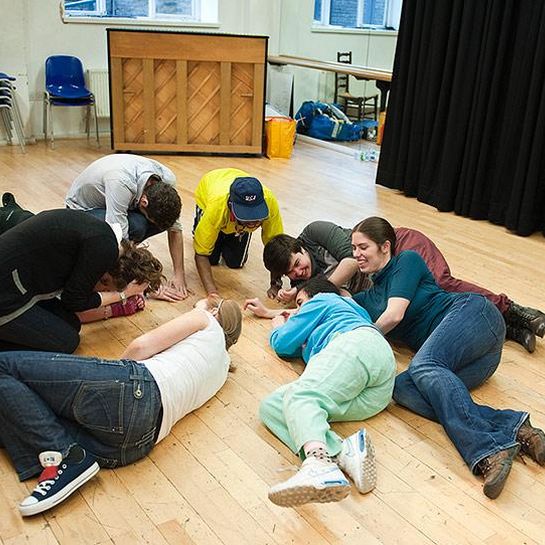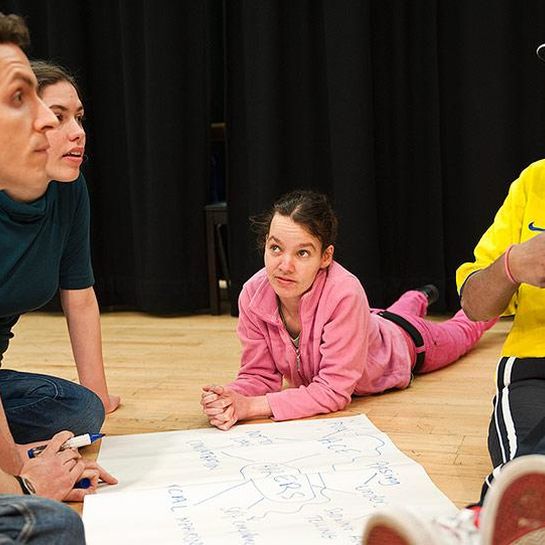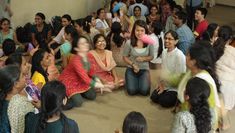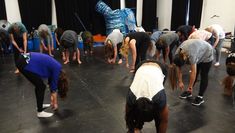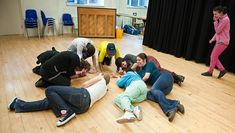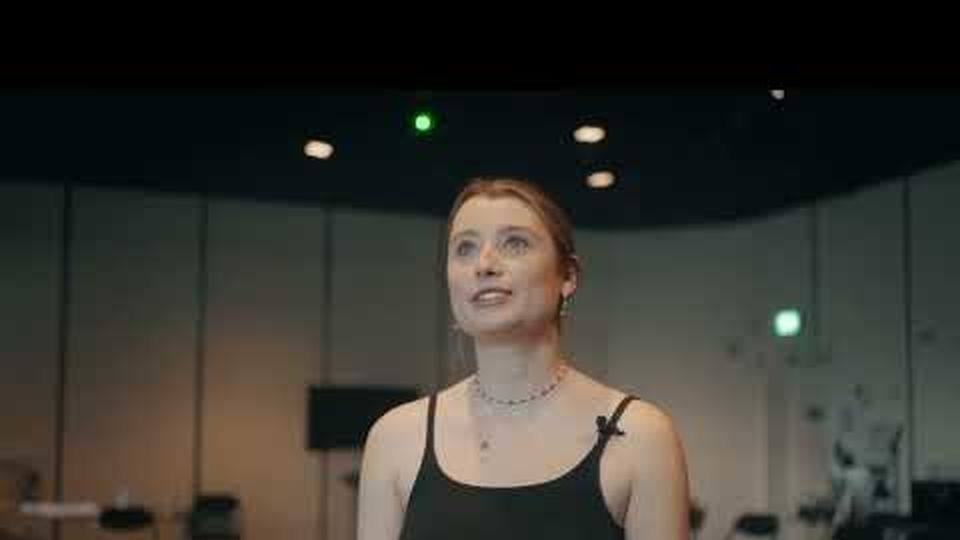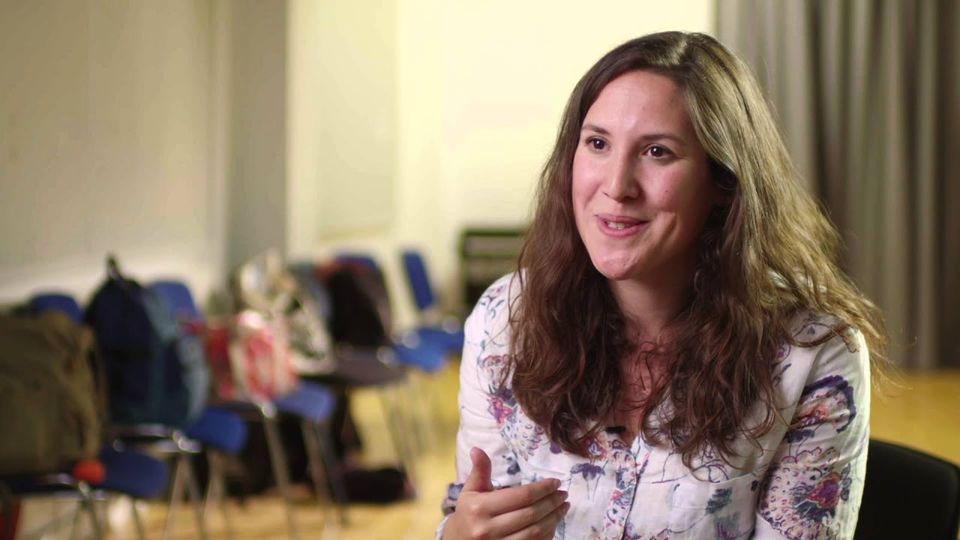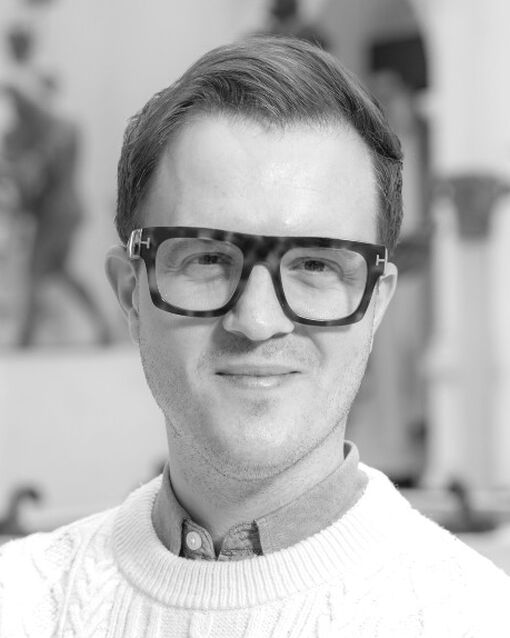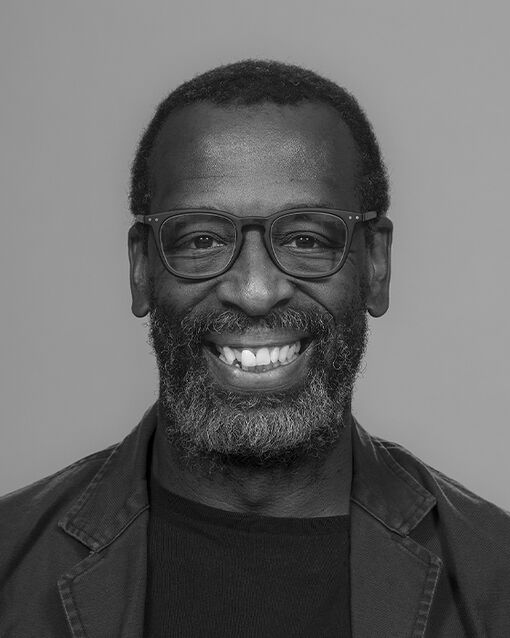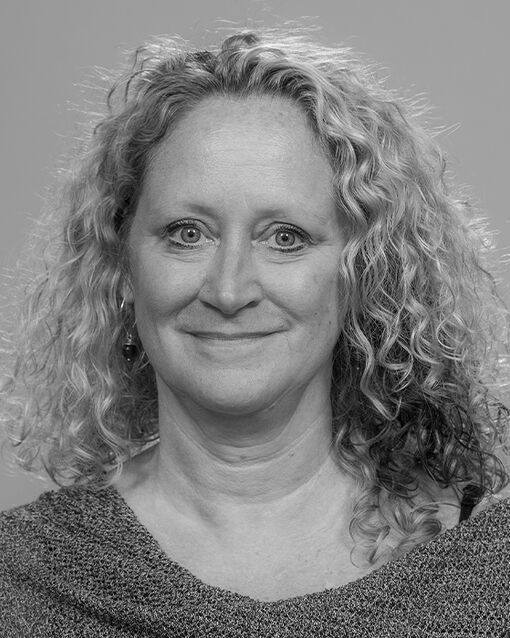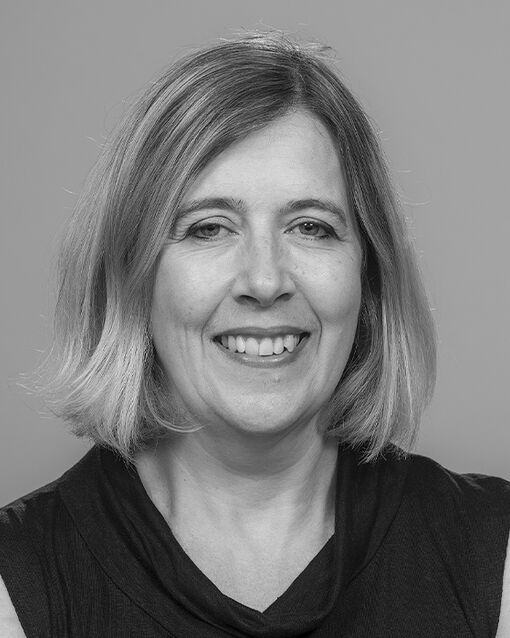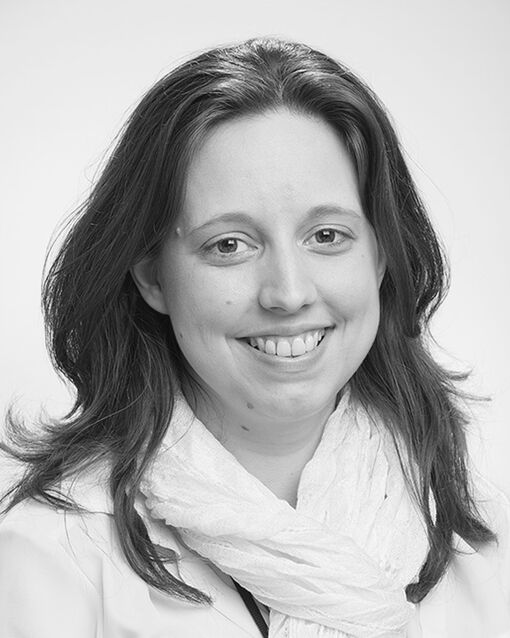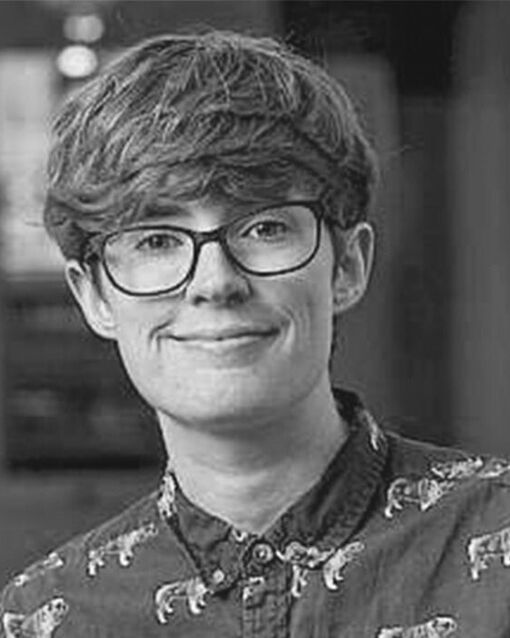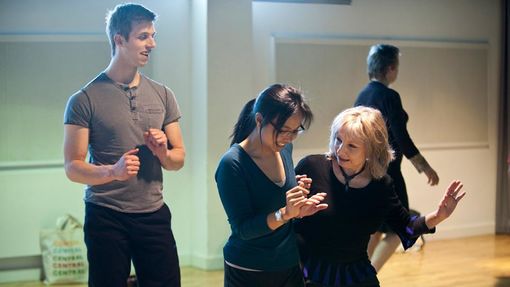Course information
Apply now buttons
Apply here:
Buttons
About this course
The MA Applied Theatre encourages investigation into the possibilities and contradictions of drama and theatre practice as transformative and rehabilitative, and engages practically and critically with a range of theories and current practices. As a student on the programme, you will:
- Gain knowledge of theatre in extensive applied, community and drama education settings, in the UK and globally
- Combine theory and practice in exploring how theatre can change lives
- Offers industry placements globally
Key features of the programme
Key features of the MA Applied Theatre are:
- exploration of theatre work in specific settings;
- key practices in applied theatre;
- a theoretical engagement with new ideas in the field;
- project-based study examining specific professional work with a varied range of client groups;
- or specialising in working with people whose lives have been affected by the criminal justice system.
The course develops knowledge of the ways in which drama and theatre are used to benefit a range of distinct groups that are key to today’s evolving cultural landscape.
Pathway options
It offers two specialist pathways: Drama in the Community and Drama Education or Drama and the Criminal Justice System. Each pathway is specifically designed to support current practice at work, or a particular field of interest in the developing landscape of applied theatre and drama in the UK. You will have the opportunity to develop your own practice and scholarship.
About Applied Theatre at Central
Applied theatre at Central is highly regarded internationally as a world leader with the largest number of specialist teaching staff in the field.
Who is the course aimed at?
This course is aimed at those interested in developing current practice of using theatre and drama in community and education settings, or of using theatre and drama with people whose lives have been affected by the criminal justice system.
Leverhulme Funding for Applied Theatre students
Central has the only applied theatre courses where students have access to funding from the Leverhulme Trust to support distant placements. Find out more about how The Leverhulme Trust is providing major funding for the many exciting Applied Theatre student projects in 2017.
Course Video
Accordion
-
Course Detail
MA Applied Theatre > Drama in the Community and Drama Education
This pathway is for individuals wishing to develop current, or new, practice of using theatre and drama with people in a range of settings that may include schools, theatres, outreach departments, hospitals and prisons. Concerned with advanced enquiry into theatre for change or education, it enables you to situate your own emergent/ developing practice within a wider understanding of the applied theatre field. Delivery of the pathway involves contributions and placement opportunities from prestigious key UK organisations.
MA Applied Theatre > Drama and the Criminal Justice System
If you want to develop current – or new – practice of using theatre and drama with people whose lives have been affected by the criminal justice system, this pathway is for you. Concerned with advanced enquiry into prison theatre, it enables you to situate your own emergent/developing practice within a wider understanding of the applied theatre field. Delivery of the pathway involves contributions and placement opportunities from prestigious key UK organisations.
Both Pathways
During Terms One and Two on both pathways, you will investigate applied theatre in a variety of contexts, communities and settings. You will explore the field’s diverse practices and engage creatively with the forms and aesthetics of applied theatre, the transformative potential of theatre and the ethics of intervention and notions of inclusive practice when working with specific groups.
The units will focus on theatre practices that promote inclusion and will address the ways in which theatre can be an agent for change, enablement and transformation, while problematising these terms. You will participate in workshops and seminars to explore practices that make a difference to people by engaging with issues, dramatising relevant stories, representing role models or possibilities for action, and involving participants in processes that they find useful, informative or exciting. This will also develop an understanding of the social and cultural contexts of applied theatre.
For both pathways, study is undertaken through traditional academic means, as well as hands-on learning in the form of industry placements. Learning will be guided by tuition from professional specialists involved in theatre in a variety of community settings, including the academic experience of Central’s renowned applied theatre and drama education tutors.
You will have the opportunity to engage with relevant research methods in your field, usually presenting your work at Central’s annual postgraduate conference.
During Term Three, you may undertake project work (or further placement/professional practice) as part of an assessed unit.
On the Drama in the Community and Drama Education pathway, you may work individually, or as part of a small group, on a practical project, such as an arts residency in a primary or special needs school, a devised play andworkshops for refugee children in the UK or abroad, creative playwriting workshops with selected client groups, or a performance and workshop on Bertolt Brecht’s theatre practice for post-16 students in schools and colleges in and around London.
On the Drama and the Criminal Justice System pathway, you may work individually, or as part of a small group, on a practical project which might include a residency in a prison or young offenders’ institution, a devised play and workshops with fathers in prison for their children, or creative playwriting workshops with prisoners or ex-prisoners.
On both pathways, you will theorise this work, interrogating its relationship within current and seminal discourses in the field.
Term Three may lead to a performance with a specified community, or may be more process orientated. Recent examples of project work include:
- a community radio project in Brazil,
- a series of workshops with the young platform dwellers of Jaipur Station in India,
- working with students in a hospital school in London,
- teaching English as a second language through drama with hotel staff in Thailand,
- working on Shakespeare in performance with a youth theatre,
- developing a range of theatre activities within a centre for the homeless in London,
- and introducing drama techniques to a special needs school in Ghana.
Recent examples of work within the criminal justice system have included:
- an arts residency in HMYOI Feltham,
- a variety of performance-related work at Thameside Prison working with Second Shot in the areas of restorative justice,
- making theatre with the residents of a prison in Malta,
- Theatre-in- Education (TIE) for those at risk
- devising and performing plays for invited audiences.
You may also work alongside a professional host or in one of Central’s partner placement institutions in the third term, or use their own work-based practice. In addition, students have the option to join one of Central’s many cross-School optional courses.
At the end of the year, you will consolidate your knowledge and understanding through a Sustained Independent Project (SIP). This is a dissertation about an area of particular interest in applied theatre.
Routes onto the MA Applied Theatre
Central offers a PG Certificate Applied Theatre with Young People: Directing Text in association with the National Theatre, as part of their National Connections scheme.
All students participating in placements will be required to complete a Disclosure and Barring Service (DBS) check. This is a mandatory government safeguarding scheme for all those seeking to work in any capacity with minors or vulnerable adults.
Assessment
Each unit has a written and/or practical assessment and submission of a dissertation addressing your specialist area of interest.
-
Entry Requirements and Interviews
Invitation to interview and admission will be based on the reasonable expectation from your application that you have the potential to complete and contribute positively to the degree and that you would benefit from master’s level study. You will normally have a degree or equivalent qualification in an arts-related subject and/or two years relevant professional experience.
Applicants will normally be able to demonstrate the following:
- relevant qualifications (e.g. undergraduate degree or equivalent), or professional experience which has prepared you equivalently for advanced study
- evidence of a specific commitment to the course, with an understanding of relevant issues and practices
- evidence of appropriate level of skills/competencies
- evidence of the ability to work in collaboration with colleagues and, where relevant, with external parties
- evidence of a capacity to work at master’s level, for example engaging with complex matters in the field, or demonstrating originality in the application of knowledge.
All students attending placements will be required to complete a Disclosure and Barring Scheme check (DBS). This is a mandatory government safeguarding scheme for all those seeking to work in any capacity with minors or vulnerable adults.
We particularly encourage applications from groups currently under-represented in higher education, such as students with disabilities and members of Black, Asian and Minority Ethnic groups. Find out more information on Central’s commitment to equality and diversity.
Accreditation of Prior Learning
Applicants who have up to 60 M Level credits from a related PGCE course are welcome to apply to the Applied Theatre, MA through our Accreditation of Prior Learning (APL) system. If you are a PGCE graduate from Central with 60 M Level credits (i.e. from 2007 onwards), you may apply without using the APL scheme and, subject to your application and availability of places, be accepted onto the MA. Applicants entering the degree programme with 60 M Level credits will, therefore, usually be expected to undertake 120 further credits (i.e. two thirds) of the programme. APL is a process that can, exceptionally, allow a student to join a course at an advanced stage and be given ‘credit’ for the section(s) of the course s/he has missed. The student will be deemed to have passed in the missing elements and, if necessary, a mark will be allocated to represent the mark that it is judged that the student might have achieved had s/he taken the assessments. The first stage in making an application for APL is by making a formal application for the course. Further details are available from the Admissions and Student Recruitment Office.
English Language
Applicants for whom English is not their first language are required to prove their English language proficiency by gaining an overall score of 7.0 in an IELTS test. We do accept equivalent English language qualifications. Applicants are advised to gain this certification as early as possible and more information can be found through the English Language Requirements page.
Application Details
Application is direct to Central. Entrance is by application and online interview via the video conferencing software, ‘Zoom’.
Applicants will be required to submit the following prior to interview:
- Submit a short (500 words) account of an aspect of theatre/arts education practice that you would like to explore in greater depth. Your account should state why this aspect interests you and how it relates to broader issues of diversity and social inclusion.
The interview will include:
- A discussion of your short 500-word account
- Discussion of your application for this particular programme, drawing on information provided by you in your application form
- A briefing on the course structure and study at Central.
For further information see the How to Apply section.
International Applicants
Central regularly welcomes students from all over the world – and we are proud to have a large network of alumni working internationally.
Visit our International Students pages for advice and information on studying at Central and living in London, if you’re not a home applicant.
There is no formal application deadline for our MA courses. Applications are assessed, and places offered on courses, on a rolling basis, and applications are closed when a course becomes full. Therefore, you are encouraged to apply as soon as possible.
-
Industry Links & Placements
Based in London, Central can offer optional industry support in the first two terms with an extensive choice of placement opportunities selected from the city’s wide array of innovative professional companies, including:
- Clean Break,
- Cardboard Citizens,
- Almeida Theatre,
- Graeae Theatre Company
- Synergy Theatre Project.
Recent examples: MA Applied Theatre > Drama in the Community and Drama Education
Theatre and Disability
Previous placement hosts include Graeae Theatre Company, Kazzum, Corali Dance Company, Extant Theatre Company
Young People’s Theatre
Previous placement hosts include Unicorn Theatre, DreamArts, Big Fish Theatre Company, Half Moon Young People’s Theatre, Islington Community Theatre, Covenant House New York, Fringe Benefits Los Angeles
Drama in the Community
Previous placement hosts include Spare Tyre Theatre Company, London Bubble Theatre Company, Cardboard National Theatre, Shakespeare’s Globe Education, The Old Vic, Cornerstone Theatre, Los Angeles
Drama Education
Specific drama departments within primary and secondary schools and further education colleges, Pupil Referral Units in London, India and the USA. MA Applied Theatre
Recent Examples: Drama and the Criminal Justice System
- Clean Break,
- Only Connect,
- Paradise Park PRU,
- HMP Lowdham Grange,
- The National Youth Theatre Playing Up Project,
- Second Shot based at HMP Doncaster and Thameside,
- HMYOI Feltham,
- Synergy Theatre Project,
- Prisons in the UK, Malta, Canada and the USA.
-
Recent Graduate Employment
Graduate employment and career pathways include:
- Schools Engagement Officer, The Young Vic Theatre.
- Assistant Head Teacher, Britannia Village School.
- Educational Development Advisor, Dramatic English in Hong Kong.
- Applied Theatre Lecturer, FLAME University, India.
- New Works/Literary Officer, Graeae Theatre Company.
- Drama Facilitator, Applied Theatre Consultants, New Zealand.
- Producer, Learning and Participation, English National Opera.
- Drama Facilitator, The United Nations.
- Head of Education, Clean Break.
- Adviser, Intervention Centre HMYOI Feltham.
- Lecturer, Hong Kong Academy for Performing Arts.
- Drama Facilitator, Doncaster Prison.
- Director, Theatre Digital Sustain.
-
Notable Graduates
Notable graduates of this course include:
Carissa Hope Lynch (2009) Deputy Literary Manager at the Royal Court Theatre.
Molly Mullen (2008) Applied Theatre Lecturer at the University of Auckland.
Jamie Wilcox (2011) Youth Theatre Director at The Egyptian Theatre Utah, USA.
Jessica Fisher (2008) Playwright winner of the Nick Darke Award 2010.
Rebecca Boden (2012) is the Director and Drama Facilitator for Unlock Drama, which provides hard-to-reach participants access to drama by offering affordable, innovative and versatile workshops.
Kiel Richardson (2007) Deputy Head at Britannia Village Primary School.
Ali Godfrey (2011) Director at Generation Arts.
Zaylie-Dawn Wilson (MA Applied Theatre and Drama Education 2012) is the Programme Manager for OYAP Trust, specialising in Youth and Community for the Albany, Deptford. This follows on from her work with OYAP as a Youth Arts Programme Coordinator.
-
Recent Visiting Professionals
- Anna Herrmann (Clean Break)
- Esther Baker (Synergy Theatre Project)
- Amit Sharma (Graeae Theatre Company)
- Natalie Mitchell (Almeida Theatre)
- Rob Watt (National Theatre)
- Saul Hewish (Rideout)
- Divya Bhatia (Stage Left India)
- Samantha Lane (Little Angel Theatre)
- Ned Glasier (Islington Community Theatre)
- Paul Sutton (C&T Theatre).
-
Tuition Fees, Bursaries and Scholarships
Tuition Fees for 2024 Entry
UK (Home) students: £11,550 (Full-time), £5,775 (Part-time)*
Overseas students: £22,050 (Full-time), £11,025 (Part-time)Please note that there may be additional costs that you need to incur as part of the training for the course.
Full information is available on the Tuition Fees and Additional Costs page.
Bursaries and Scholarships
Central offers a range of bursaries and scholarships. If you are holding an offer for a place on a course then you will be invited to apply for a bursary or scholarship.
*If you are a UK student but already hold a qualification at the equivalent or higher level to the one that you are applying for, then you may be classed as an ELQ student and be required to pay the same fee as an overseas student.
Student Feedback
“The course gave me the tools and confidence to creatively engage with the social and political issues that I feel so passionate about. The practical side was really important for me, as my background was not necessarily theatre related.”
Marine Begault
Graduated 2014, working with a number of companies including Magic Me, Border Crossings and Tender.
“When I started the MA I began to understand how productive it was to combine practice and theory in my ongoing work. I really got to refine those ideas during my practice PhD and now as a lecturer and researcher at Central, I share my practice with my Applied Theatre students.”
Dr Sylvan Baker
Lecturer and researcher in community performance/applied theatre.
Staff On The Course
Simon Dodi is a lecturer, researcher and museum learning producer.
Sylvan Baker is a care leaver and an award-winning practitioner, researcher and an academic.
Selina Busby is an international theatre maker working with community groups, an author, academic, researcher, Principal Lecturer and the Course leader of the MA Applied Theatre at Central.
Amanda Stuart-Fisher is an academic and playwright with a strong interest in new writing and verbatim and testimonial performance practices.
Nicola Abraham is a multi-award-winning applied theatre practitioner and an academic.
Sarah Bartley is a community arts practitioner and applied performance scholar.

